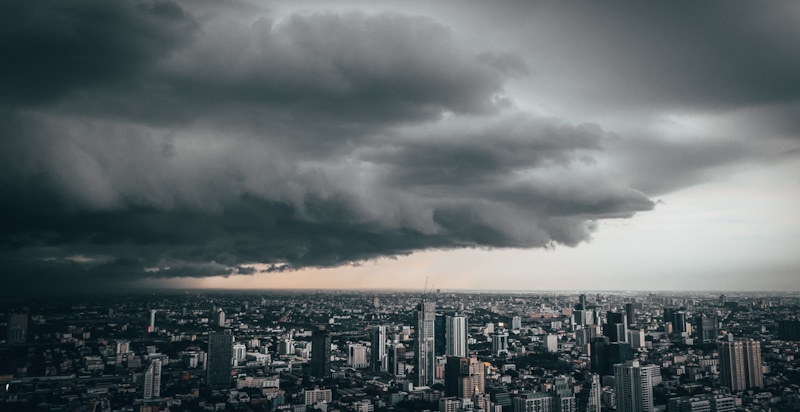We make use of many idioms in our day-to-day lives without really noticing it. Some idioms have positive meanings, while others signify warnings, gloom and a bad omen. One such term is “clouds on the horizon.” So let’s explore the meaning, origins and usage of this term.
The phrase “clouds on the horizon” is an omen that something problematic or harmful is likely to occur in the not-so-distant future. It’s an indication that something is almost certainly going to take place soon. So it implies an impediment, obstacle or negative expectations for the future.
“Clouds on the Horizon” – Origins of the Phrase
When it comes to the origins of this phrase, not much is known. There isn’t any evidence that points to a specific person who first made mention of the idiom; however, it is believed that the word “horizon” dates back to the late 1300s. A few references are also made to Greek, Latin, and French words.
The only way we believe this phrase could have come about is through taking note of certain aspects of nature. For instance, even though you cannot see the sun every morning, you already know when it’s on the horizon.
We are aware of things before or as they are about to happen due to the curve of the earth. So when starring at the earth, around the point where the sky meets the earth, you will get a glimpse of higher parts such as buildings and mountains prior to the land being seen.

“Clouds on the Horizon” – Meaning
When people use the term “clouds on the horizon,” it usually implies that they foresee something bad happening soon. The horizon is almost always within eyesight. For instance, when standing on the beach and looking into the sea, you are bound to see the horizon. So likewise, when people say that there are “clouds on the horizon,” it simply means that something bad is about to happen pretty soon or sooner rather than later.
When and How to Use “Clouds on the Horizon”
You would normally use this term to warn someone that something terrible or harmful is about to happen. It may be harmful in a literal or figurative way.
When: Use it to warn someone of something bad that is going to happen.
How: You may simply refer to a situation and say that you see “clouds on the horizon.”
Other Ways to Say “Clouds on the Horizon”
- There is an impediment
- Bad omen
- There is an obstacle
- Bad sign for the future
- Sign of difficulty to come
- Negative expectations
- Sign of trouble on its way
- There is a hurdle
- Aggravation
- Declension
- Future is bad
- Future is bleak
- Future problem
- It could be a bad sign
- Loss
- Negative outlook
- Negative forecast
- Potential issue or problem
- Sky isn’t blue
- Something bad will happen
- Something is wrong
- There is a barrier
- There is a stumbling block
- Trouble is coming

Opposite of “Clouds on the Horizon”
- Future is bright
- Untroubled future
- Glittering future
- Light at the end of the tunnel
- Sparkling future
- After rain comes fair weather
- Silver lining
- A blessing in disguise
- After clouds come sunshine
- Better future
- Better tomorrow
- Better prospects or opportunities
- Bright new dawn
- Fine future
- The darkest hour is just before dawn
- Promising future
- Better world
- Great prospects
- Fine future
- Every dog has its day
- More promising future
- New tomorrow
Other Idioms that Make Use of the Atmosphere and Weather
While there are many other ways to imply the same meaning as “clouds on the horizon” there aren’t any idioms as such, however, we did find a few terms and phrases that also make use of the atmosphere and the weather. Let’s take a look at them below:
“Take a rain check” – When people say that they will “take a rain check,” they simply mean that they cannot accept an invitation at the present moment but will accept it later.
Example: His Susan, I called to say thank you for the invitation to your pool party; however, I cannot make it but will take a rain check, thank you.
“It never rains, but it pours” – This expression is used to show how when one bad thing happens to you, other bad situations are soon to follow or occur all at once.
Example: John left the house and left his briefcase at home, then he realized he had lost his wallet, and when he got to the parking area, his car had been stolen, it never rains, it pours.
“Come rain or shine” – This term is used to show how a person is religious in a specific action or task, irrespective of the circumstances.
Example: Leah goes to the gym every day without fail, come rain or shine.
“Reach for the moon” – This idiom is used to express how people can be ambitious irrespective of how difficult something is to achieve.
Example: Our parents were hard-working and always encouraged us to reach for the moon.
“Once in a blue moon” – This idiom explains how some things happen only occasionally or very rarely.
Example: Sadly, Mary has very little contact with her mum; in fact, they see each other once in a blue moon.
“Kept in the dark” – This term shows how information can be withheld from people.
Example: Jane’s daughter is pregnant, but Jane hasn’t told her husband anything; he’s kept in the dark.
“A storm is brewing” – This term means that people are anticipating something bad happening. It is usually an indication of an outburst of emotion such as anger.
Example: As soon as I saw his face, I knew there was a storm brewing.
“Under the weather” – This idiom is used to show that a person is feeling unwell.
Example: I didn’t send my daughter to school today; she was a bit under the weather.
Example Conversations with “Clouds on the Horizon”
Conversation between two sisters Jane and Andy:
Jane: So have you and Tom sorted out your marriage issues?
Andy: Not yet; we’re just giving each other some space; I think it’s best for now.
Jane: But you know that it’s also important to resolve any issues that could resurface in the future?
Andy: Yeah, I don’t think that will happen.
Jane: Well, that makes one of us cause I still see some clouds on the horizon.
Conversation between mother and daughter:
Mother: I’m glad that you decided to stop being friends with those girls who were bullying you at school.
Daughter: Yes, mum, me too, but they were not too impressed that I reported them to the principal.
Mother: Well, they’ll get over it.
Daughter: I’m not so sure about that mum, I still see some clouds on the horizon.

Example Sentences with the Idiom “Clouds on the Horizon”
- While I wasn’t too sure if Jane and Tom would make a good match, things seem to be okay between them, and there are no apparent clouds on the horizon.
- Although Martin has finally started his business, I still anticipate some clouds on the horizon.
- My son seems to be doing well at school after a long time, so I don’t foresee any clouds on the horizon.
- While the infection rate appears to be dropping, we’re not out of the woods yet, and there are still clouds on the horizon.
- I’ve been getting a bad feeling lately as if there are clouds on the horizon.
- My mum and sister-in-law seem to be getting along just fine nowadays, so it’s hard to tell if there are clouds on the horizon.
- There will always be clouds on the horizon as long as Jane and Tom don’t sort out their marriage issues.
- While the future seems to be bright, I can only wonder if there are clouds on the horizon.
- People seem to be in high spirits about the upcoming year, but I still see clouds on the horizon.
- It’s always best to prepare for clouds on the horizon instead of being caught off guard.
- Whether you have insight or not, preparing for clouds on the horizon is the best thing you can do.
- When you see clouds on the horizon, don’t head for the hills but rather deal with them head-on.
- If you don’t resolve your issues as they arise, there will always be clouds on the horizon.
- While some countries are recovering from the pandemic, there are clouds on the horizon for many of them.
Conclusion
The term “clouds on the horizon” has been used for years to indicate a potential problem, issue, or bad omen. It is always used to show something harmful or bad and is never used in a positive context. While this phrase’s origins are not known, it is still an effective way to communicate your feelings with others. Now that you have a better understanding of the meaning of this term, you will be able to use it more effectively in both your daily communications with people and your writing.
Shawn Manaher is the founder and CEO of The Content Authority. He’s one part content manager, one part writing ninja organizer, and two parts leader of top content creators. You don’t even want to know what he calls pancakes.

